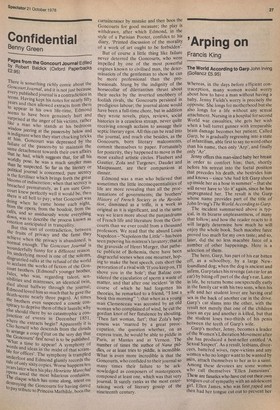Confidential
Benny Green
Pages from the Goncourt Journal Edited by Robert Bald ick (Oxford paperbacks e2.95) There is something richly comic about the Goncourt Journal, and it is not just because every published journal is a contradiction m terms. Having kept his notes for nearly fifty Years and then allowed extracts from them to appear in his own life-time, Edmond seems to have been genuinely hurt and surprised at the anger of his victims, rather like a man who stands at his bedroom window jeering at the passers-by below and IS indignant when they start chucking bricks at him. Goncourt was depressed by the failure of the passers-by to maintain the same detachment towards their own affairs that he had, which suggests that, for all his worldly pose, he was a much simpler man than he suspected. So far as the literary or Political journal is concerned, pure secrecy is the fertiliser which brings forth the great blooms of indiscretion; when that secrecy is breached prematurely, as I am sure Goncourt knew perfectly well it would be, then there is all hell to pay; what Goncourt was doing when he came home each night, from the opera, from the boudoir, from the cafés, and so assiduously wrote everything down, was to describe the process known as emotion anticipated in tranquility. But this sort of contradiction, between the fruits of privacy and the fame they achieve when the privacy is abandoned, is normal enough. The Goncourt Journal is wounderfully funny for a different reason. Its underlying mood is one of the solemn, disgruntled sulks at the refusal of the world to acclaim the works of fiction of the Goncourt brothers. (Edmond's younger brother, Jules, who was, regarding talent, sensibilities and mistresses, an identical twin, died about halfway through the journal; Edmond loved him so much that he gave the death-scene nearly three pages). At times the brothers even suspected a cosmic conspiracy to deprive them of their laurels; why else should there by so catastrophic a conjunction of events in December 1851, Where the extracts begin? Apparently it is Cho herself who descends from the clouds to arrange a coup d'etat on the very day that the Goncourts' firs novel is to be published. What a time to appear! A symphony of words and ideas in the midst of that scramble for offices'. The symphony is trampled underfoot and Edmond glumly records the Sale0. f only sixty copies. Worse happens ten years later when his play Henriette Marechal °Pens amid the most hilarious confusion. The claque which has come along, intent on destroying the Goncourts for having dared to Pay tribute to Princess Mathilde, boos the curtaineraiser by mistake and then boos the Goncourts for good measure; the play is withdrawn, after which Edmond, in the style of a Parisian Pooter, confides to his diary, 'Printed discussion of the morality of a work of art ought to be forbidden'.
But of course a little thing like failure never deterred the Goncourts, who were impelled by one of the most powerful engines known to civilised man, the determinatio'n of the gentleman to show he can be more professional than the professionals. Stung by the indignity of the horsecollar of dilettantism thrust about their necks by the inverted smobbery of foolish rivals, the Goncourts persisted in prodigious labour; the journal alone would have been a full-time chore, but in addition they wrote novels, plays, reviews, social histories in a ceaseless stream, never quite receiving enough acclaim to assuage their septic literary egos. All this can be read into the journal, and much else besides, as the Goncourts, born literary malcontents, commit themselves to paper. Fortunately for posterity, they happened to move in the most exalted artistic circles. Flaubert and Gautier, Zola and Turgenev, Daudet and Maupassant, are their companions at dinner.
Edmond was a man who believed that sometimes the little inconsequentialities of life are more revealing than all the proclamations of governments; the brothers' History of French Society in the Revolution, dismissed as a trifle, is a work as original as it is significant, and in the same way we learn more about the panjandrums of French life and literature from the Goncourts than we ever could from a thousand professors. We read that the absurd Louis Napoleon —Napoleon the Little' — has been seen papering his mistress's lavatory; that at the graveside of Henri Murger, that pathetic publicist of Bohemia, there have been disgraceful scenes when one mourner, hoping to make the best speech, cuts short the peroration of a rival with `If you keep on, I'll shove you in the hole'; that Balzac considered the ejaculation of sperm a waste of matter, and that after one incident 'in the course of which he had forgotten his theories, he remarked to a friend, lost a book this morning" '; that when as a young man Clemenceau was accosted by an old woman who complained of wind, he cut the gordian knot of her flatulence by shouting, 'Then fart woman, fart'; that Zola's happiness was 'marred by a great preoc cupation, the question whether, on an express train, he would be able to piddle in Paris, at Mantes and at Vernon. The number of times the author of Nana pid dles, or at least tries to piddle, is incredible. What is even more incredible is that the Goncourts, who confided to their journal so many times their failure to be ack nowledged as composers of masterpieces, composed at least one, which was that very journal. It surely ranks as the most entertaining work of literary gossip of the nineteenth century.






































 Previous page
Previous page